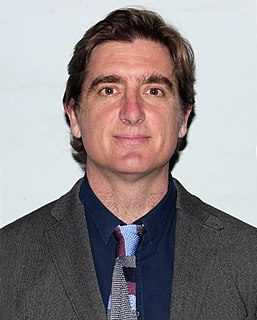A Quote by Marcel Theroux
Literature itself is a species of code. You line up symbols and create a simulacrum of life.
Quote Topics
Related Quotes
But what if God himself can be simulated, that is to say can be reduced to signs that constitute faith? Then the whole system becomes weightless, it is no longer anything but a gigantic simulacrum - not unreal, but simulacrum, that is to say never exchanged for the real, but exchanged for itself, in an uninterrupted circuit without reference or circumference.
Learning how to code and program computers when I was a kid was one of the best choices I made growing up. By writing code, I learned how to bring my dreams to life, how to budget, and how to build stuff. Whatever path you choose in life - being an artist, an engineer, a lawyer, a teacher, or even a politician, you will give yourself a huge leg up if you learn how to code.
An animal is equipped for sustaining its life; its senses provide it with an automatic code of action, an automatic knowledge of what is good for it or evil... Man has no automatic code of survival. His particular distinction from all other living species is the necessity to act in the face of alternatives by means of volitional choice.
A belief, however necessary it may be for the preservation of a species, has nothing to do with truth. The falseness of a judgment is not for us necessarily an objection to a judgment. The question is to what extent it is life-promoting, life-preserving, species preserving, perhaps even species cultivating. To recognize untruth as a condition of life--that certainly means resisting accustomed value feelings in a dangerous way; and a philosophy that risks this would by that token alone place itself beyond good and evil.
Books should confuse. Literature abhors the typical. Literature flows to the particular, the mundane, the greasiness of paper, the taste of warm beer, the smell of onion or quince. Auden has a line: "Ports have names they call the sea." Just so will literature describe life familiarly, regionally, in terms life is accustomed to use -- high or low matters not. Literature cannot by this impulse betray the grandeur of its subject -- there is only one subject: What it feels like to be alive. Nothing is irrelevant. Nothing is typical.
In fact a man in love or one consumed with hatred creates symbols for himself, as a superstitious man does, from a passion of conferring uniqueness on things or persons. A man who knows nothing of symbols is one of Dante's sluggards. This is why art mirrors itself in primitive rites or strong passions, seeking for symbols, revolving round the primitive taste for savagery, for what is irrational (blood and sex).
One of the things I always underscore when I teach criticism is that young critics, or would be critics, frequently have this illusion that if they write about music they're somehow part of music, or if they write about movies they're part of movies, or of they write about theater they're part of theater, or write about literature. Writing is a part of literature, we belong the species of literature. If you add all the music reviews together that have ever been written, they don't create two notes of music.







































